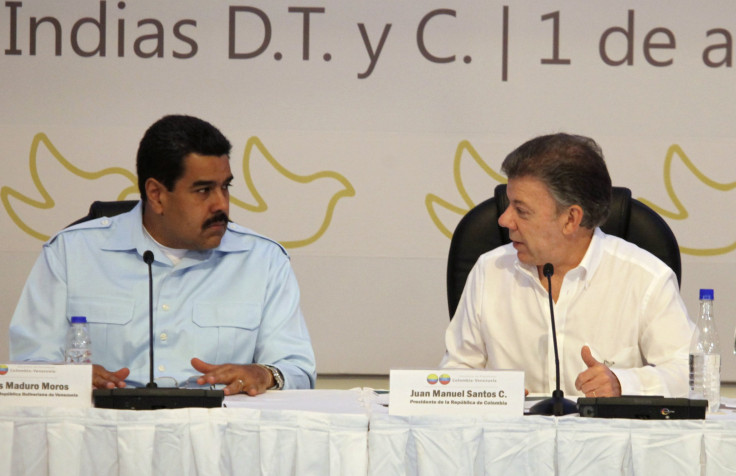To Resolve Border Dispute, Colombian President Juan Manuel Santos Requests Meeting With Venezuelan President Nicolas Maduro

Colombian President Juan Manuel Santos criticized Saturday Venezuela's decision to temporarily close two border crossings between the two countries and declare a state of emergency in a number of nearby municipalities. Venezuelan President Nicolas Maduro has defended the moves as a necessary response to the clashes between Colombian drug smugglers and his government's forces that have left three soldiers dead.
"What's the real reason behind these measures, for the states of emergency they decreed? We don't know," Santos said at a cabinet meeting.
Venezuela closed the border crossings Wednesday night and subsequently extended the shutdown indefinitely. Two days later, Maduro put into effect a suspension of constitutional guarantees for 60 days that applies to five border municipalities in the state of Tachira. It marks the first time a Venezuelan president has made use of the relevant provisions, which are outlined in the 1999 constitution -- the first year the now-deceased President Hugo Chavez served in office.
"If it's for security reasons, the response shouldn't be to close the border, it should be to collaborate in a more effective way with Colombian authorities because we have the same interests: We're trying to get rid of these criminal gangs," Santos said. "We should have our respective authorities work together."
The Colombian leader also called on his Venezuelan counterpart to meet Wednesday in an attempt to find a diplomatic solution to the escalating problem.
Meanwhile, Chavez's successor defended his use of the controversial decree in a speech Friday night. "This decree provides ample power to civil and military authorities to restore peace," he said. "We've been discovering a frightful reality about how the criminals and paramilitaries operate. I'm under the obligation to free Venezuela of all this."
Some critics of the Maduro government have dismissed the move as a political ploy ahead of legislative elections in December.
© Copyright IBTimes 2024. All rights reserved.












